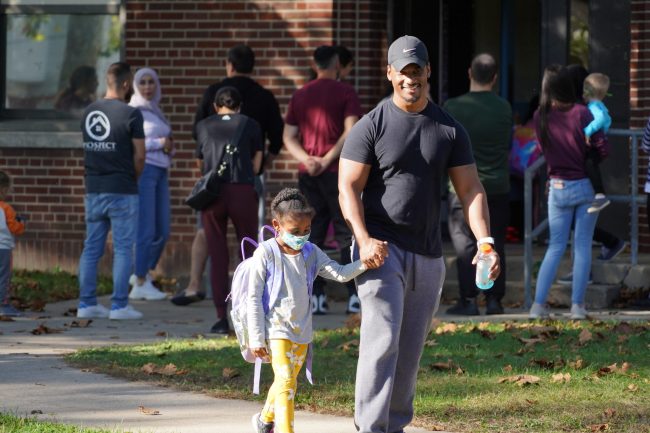After a successful pilot last year, Healthy Dearborn and Dearborn Public Schools are expanding to 18 schools a program that encourages students and families to walk or bike to school.
Participating schools will kick off their Fall Walk N’ Roll Jr. challenge the week of Sept. 12 to 16 with presentations to students and permission slips for parents to sign. Students will be encouraged to log which days they walk or bike to or from school from Sept. 19 to Oct. 28. Students will be eligible for small prizes for participating and could potentially win a new bike. Schools have the chance to win the honor of displaying a giant traveling trophy by logging the most trips walking or biking to school over the six weeks.
Like last year, the fall program will be followed by a winter walking club with a T-shirt design contest and another Walk N’ Roll challenge in the spring.
Walk N’ Roll Jr. is possible under the umbrella of the Healthy Dearborn Coalition, which includes key organizations such as Dearborn Public Schools, the City of Dearborn, Beaumont Health, and the University of Michigan – Dearborn. Grant funding was provided by the Michigan Fitness Foundation.
Physical education teacher Dr. Ryan Lazar is again spearheading the program in the district.
“This programming is of course fun but the main take-aways are increasing students’ physical activity and fitness and therefore overall health and at the same time reducing vehicular traffic around the schools at drop-off/pick-up time and in turn increasing safety,” Dr. Lazar said.
Last spring, 15,564 walking or biking trips were taken to or from school over the six weeks of the Walk N’ Roll Jr. Challenge. Ten schools participated.
This year’s participating schools include Duvall Elementary, Henry Ford Elementary, William Ford Elementary, Haigh Elementary, Howard Elementary, Lindbergh Elementary, Long Elementary, Maples Elementary, McCollough-Unis School, McDonald Elementary, Miller Elementary, Nowlin Elementary, Oakman Elementary, River Oaks Elementary, Salina Elementary, Salina Intermediate, Snow Elementary, and Whitmore Bolles Elementary.
Besides health benefits, regular physical activity can also improve emotional well being, behavior, mental focus and academic performance, especially in children.
“Walking or biking to school used to be the norm for most students, and that, in turn, created a mindset that physical activity was a normal part of daily life,” Dr. Lazar said. “Obviously we are hoping this program helps nudge more students and families into thinking that way again.”

